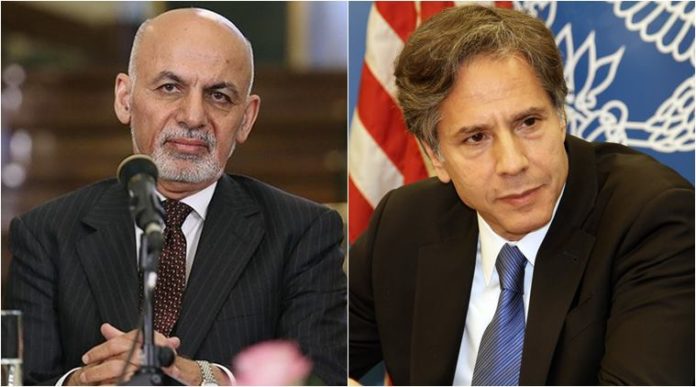New Delhi (NVI) The US push for accelerated talks with Taliban for forming an inclusive government with the extremist and terrorist militia has angered the Ashraf Ghani government, which asserted today that it will not accept “illegitimate demands” or a “coerced peace”.
The Afghan government is upset by the steps enlisted in a letter by Secretary of State Antony Blinken to President Ashraf Ghani, which includes a proposal for a UN-led conference in Turkey aimed at forming an inclusive Afghan government with the Taliban and establishing a three-month reduction in violence that will lead to a ceasefire.
Significantly, Blinken’s letter says that the UN should convene a meeting of Foreign Ministers and envoys from stakeholder countries, including the US, Russia, India, China, Pakistan and Iran to discuss a unified approach for supporting peace in Afghanistan.
Reacting to this, Afghanistan’s First Vice President Amrullah Saleh said today that Blinken’s dictate will not change the Ghani government’s stance on reconciliation efforts.
Making it clear that the Ghani dispensation will not accept any proposal for making Taliban a partner in the government, he asserted that Afghanistan will not accept “illegitimate demands” that negate the people’s right to vote.
He said that there will never be any compromise on Afghanistan’s Constitution and on the people’s right to vote.
“We need peace,” Saleh said but added that “We will make peace with dignity… We will never accept a coerced and imposed peace.”
President Ghani’s senior advisor Mohammad Mohaqiq, while echoing Saleh’s views, said “coercive” language and a “coerced” peace are not possible in Afghanistan.
“The weakness in the message of the US State Department is that they have not recognized Afghanistan’s structure and it has coercive language and a coerced and tailored peace will not lead anywhere,” he said.
Underlining that Afghanistan’s dignity should be taken into consideration, Mohaqiq said, “When we say that the Taliban must join, it is because we have a system, an army, human rights and Constitution. Why should we join the Taliban? We do not want to fight against any party to join them in the mountains.”
Saleh said, “Our relations with the West and the Americans are fundamental, but whenever our interests are violated, we inform our nation.”
Suggesting that Taliban can make a bid for the government by participating in polls, Saleh said, “we can discuss the election and the date but will never let anyone take the people’s right to vote.”
The government is ready to agree on the date of the election “if the Taliban agree on the principle of elections with us,” he said.
The First Vice President also reacted sharply to Blinken’s message that the US was considering complete troop withdrawal from Afghanistan by May 1 this year, keeping with the agreement signed with Taliban on February 29 last year in Doha.
He said the US can hold a conference and decide on the presence of its troops in Afghanistan or negotiate with the Taliban but it is the legitimate right of the Afghan government to not compromise based on others’ calendar over the fate of 35 million people in Afghanistan.
In the letter to Ghani, Blinken has suggested that the Afghan government accelerate the peace process, including convening a UN-facilitated conference with international stakeholders.
It also includes proposals to facilitate discussion between the government and Taliban to form a negotiated settlement and ceasefire and a meeting in Turkey between both sides to finalize a peace agreement.
Blinken also said that US envoy on Afghanistan Zalmai Khalilzad should share with President Ghani and the Taliban leaders written proposals “aimed at accelerating discussions on a negotiated settlement and ceasefire.
These proposals reflect some of the ideas included in the roadmap for the peace process,” the US Secretary of State wrote.
Elaborating, Blinken said: “In sharing these documents, we do not intend to dictate terms to the parties…. Rather the documents will enable the Islamic Republic and the Taliban to move urgently to the tasks of developing a) the foundational principles that will guide Afghanistan’s future constitutional and governing arrangements b) a roadmap to a new, inclusive government and c) the terms of a permanent and comprehensive ceasefire.”
Blinken said Turkey will be asked to host a senior-level meeting of both sides in the coming weeks to finalize a peace agreement.
Blinken urged Ghani or his “authoritative designees” to attend the meeting.
In the letter, he also said that the US has prepared a revised proposal for a 90-day reduction in violence, “which is intended to prevent a spring offensive by the Taliban and to coincide with our diplomatic efforts to support a political settlement between the two parties.”
He asked President Ghani to “positively consider” the proposal for the reduction in violence.
Further, Blinken wrote that even with the continuation of the US financial assistance to Afghan forces after an American withdrawal, he is “concerned that the security situation will worsen and that the Taliban could make rapid territorial gains”.
He said he shared this so that President Ghani “understands the urgency of my tone regarding the collective work outlined in this letter.”








